
Guests
- Mariana Mortáguamember of the Portuguese Parliament.
- Saif AbukeshekPalestinian activist based in Barcelona and a member of the Global Sumud Flotilla steering committee.
We speak to two activists aboard the Global Sumud Flotilla as it prepares to set sail for Gaza in an attempt to break the Israeli blockade. In recent days, two drone attacks on the flotilla ships, which are docked in Tunisia, have been reported. “We know who has interest in stopping these flotillas,” says Mariana Mortágua, a Portuguese parliamentarian who has joined the Global Sumud Flotilla and suspects the strikes were the work of the Israeli military. Mortágua says she has joined the flotilla because it’s “my duty to be here and to help in any way I can … to show people that Gaza is a real place. It’s not an abstract location. Gaza exists. It’s there. Real people are living there and are living under attack.”
We also hear from Saif Abukeshek, a Palestinian activist based in Barcelona and a member of the Global Sumud Flotilla steering committee. “There is no one mission or campaign that will have a direct outcome impact. But I believe solidarity work is an accumulative process that we have to build in,” says Abukeshek. “We have to mobilize people around the world. We have to get pressure on governments, because that’s the only way that Israel will listen and will stop their crimes.”
Transcript
NERMEEN SHAIKH: Members of the Global Sumud Flotilla are vowing to continue their efforts to break Israel’s siege of the Gaza Strip, after two of the group’s ships came under fire from apparent drone attacks while docked in Tunisia. After initially downplaying the attacks, Tunisia’s Interior Ministry said Wednesday they were, quote, “premeditated acts,” but did not name a suspect. Activists have directly implicated Israel.
Passengers aboard the flotilla include the Swedish climate activist Greta Thunberg, who was detained by Israel in June when Israeli forces raided an earlier Gaza-bound flotilla.
GRETA THUNBERG: Genocide is being enabled and fueled by our governments, our institutions, our companies, our elected officials, who are supposed to represent us. End your complicity!
AMY GOODMAN: Another passenger on the flotilla is the late South African President Nelson Mandela’s grandson, the South African MP Mandla Mandela.
MANDLA MANDELA: Coming all the way from South Africa to participate in this is really a joy to once again be able to set sail and go and break the blockade in Gaza and end the siege, which has been going on for the past 18 years. And we hope that it will be received as such, because we are a peaceful people. We pose no threat. We are carrying humanitarian aid for our brothers and sisters in Gaza.
AMY GOODMAN: We’re joined now by two guests. On the boat in the port now is Mariana Mortágua, Portuguese parliamentarian, economist. And we’re joined by Saif Abukeshek, a Palestinian activist based in Barcelona, who’s been organizing Palestinian solidarity across Europe for 20 years, was a lead organizer in the Global March to Gaza.
We welcome you both to Democracy Now! Let’s begin with the Portuguese parliamentarian, who is joining us now. Mariana Mortágua, why are you on the boat? Explain what’s happened with these two attacks and what you believe has happened.
MARIANA MORTÁGUA: OK, I’m on the boat because I think that if governments, our governments, are not doing anything to stop genocide and to break the siege, then the civil society has to organize. And I feel that as a member of the Parliament, I have — it’s my duty to do this. It’s my duty to be here and to help in any way I can to bring attention to the situation in Gaza and the genocide and to break the siege.
As we know, many flotillas before this one have been somehow attacked by Israeli forces, either through drone attacks before they left, or they were intercepted, or through bureaucratic sabotage. What we know is that in the two previous days, two of our boats have been attacked. One is the boat I’m in right now, called Family Boat, and it was attacked when one of my comrades from Portugal was on the boat and saw the drone and saw the fire that came from the drone and attacked the boat. The next day, I was on the boat, and I saw the other attack on Alma boat, which was right in front of us. These attacks were done in Tunisian waters. We were anchored by the ports of Tunisia.
And we know who has interest in stopping these flotillas, in stopping this mission to Gaza. And we are very also aware of the fact that Israel did this at the same time they were displacing 1 million people in Gaza. So, there is these tactics that they use all the time to change the attention, to move the eye from Gaza to the flotilla, from the flotilla to Qatar. And they are using this in order to draw attention away from Gaza. And we want to put attention back there. So, there are 1 million people being displaced in Gaza City right now and being bombed right now.
NERMEEN SHAIKH: Saif, could you comment? You were part of the Global March to Gaza earlier this year. Talk about the significance, the importance of these repeated attempts to break the Israeli siege on Gaza.
SAIF ABUKESHEK: Well, I mean, we see the complicity of so many governments in the genocide, in the blockade around Gaza and, of course, the support for the Israeli occupation during the past 78 years. Without civil society moving to pressure those governments, we won’t achieve any advancement for the people, for the citizens who are living there.
We have seen how the Spanish government took a decision for an embargo, a military embargo, which will stop any kind of military treatments with Israel. This is the path to go forward, and this only happens through mobilization.
In June, we have mobilized three movements — through land, by convoy from North Africa; through sea, with the Madleen; and then through air, with more than 4,000 people going from more than 80 countries to Egypt to try to pressure the complicit governments in their participation in genocide.
We have to continue working. There is no one mission or campaign that will have a direct outcome impact. But I believe solidarity work is an accumulative process that we have to build in. We have to mobilize people around the world. We have to get pressure on governments, because that’s the only way that Israel will listen and will stop their crimes. Those governments are enabling Israel to continue.
NERMEEN SHAIKH: And, Mariana Mortágua, you’re a Portuguese parliamentarian. If you could talk about what effect you think these attempts, the flotillas, the Global March, whether it’s having an impact on people, on ordinary citizens in Portugal and, you know, across Europe?
MARIANA MORTÁGUA: Yeah, I think that’s the main goal of the flotilla, besides breaking the siege and opening a humanitarian corridor to Gaza, is to show people that Gaza is a real place. It’s not an abstract location. Gaza exists. It’s there. Real people are living there and are living under attack, despite the fact that our governments just pretend that nothing is happening and that Israel is not breaking international law every day in Palestine, but also attacking these humanitarian flotillas.
So, one of the consequences of these flotillas is trying to make our governments take a stand, trying to pressure the European Commission, the European institutions to take a stand. It is unfortunate that we need to have European citizens and European parliamentarians in boats towards Gaza to make our governments say something about Israel. It is unfortunate that we need a Portuguese boat with a Portuguese flag being attacked with Portuguese citizens and parliamentarians on board, by some — I wouldn’t say that the drone has no flag, but we know who has interests in and who gains from these attacks. And it is unfortunate that we need these for the Portuguese government to say something about the genocide and to say something about Gaza.
But if this is what it takes, then we’ll continue with the flotilla to open the humanitarian corridor and to make sure that all governments in the world have to say something about the genocide. They have to recognize the genocide. And I think —
AMY GOODMAN: Mariana Mortágua, we want to thank you very much for being with us, Portuguese parliamentarian on one of the boats, part of the flotilla that hopes to challenge Israel’s siege on Gaza, and Saif Abukeshek, Palestinian activist based in Barcelona. Both are taking part in the Global Sumud Flotilla.
And as we wrap up today, here in New York, a moment of silence was observed at 8:46 a.m. this morning to mark 24 years since the September 11th attacks. That does it for our show. I’m Amy Goodman, with Nermeen Shaikh. Thanks so much for joining us.

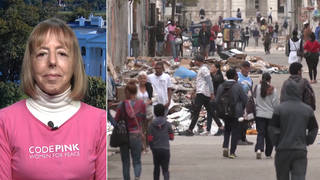
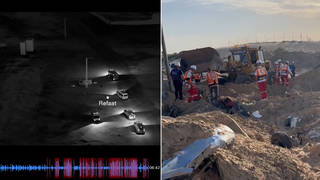
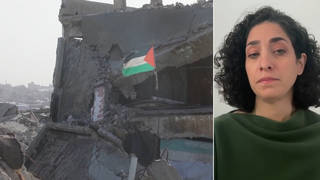
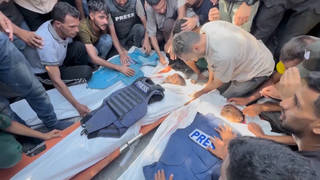





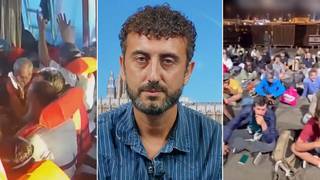
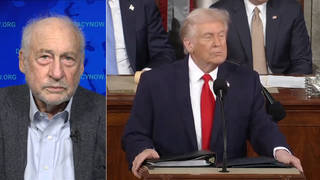
Media Options